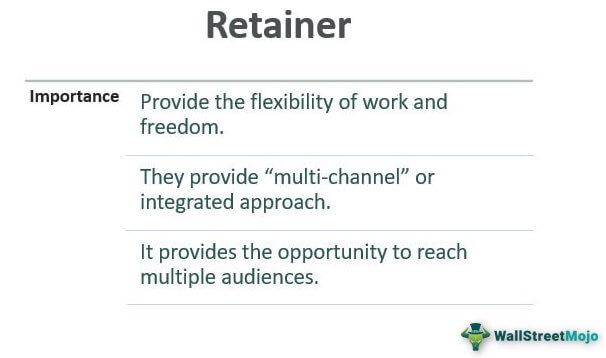Table Of Contents
Retainer Meaning
A retainer is an arrangement between the firm and service provider wherein the latter is paid an advance for the benefits likely to be taken at some time in the future. Retainers are commonly used in areas like law, accounting, HR, etc.

The retainer payment, once done, books the services an entity desires to take up from a service provider at a later date. The fee that retainers receive is normally monthly, however it can be paid quarterly, semi-annually or annually too.
Key Takeaways
- A retainer refers to an understanding between the firm and service provider wherein the payment is made to the provider in advance for the benefits likely to be taken.
- Commonly, retainers are used in areas like Law, Accounting, HR, etc.
- Earned and unearned fees are the two types of retainer fees that are decent costs paid to the retainer.
- The retainer agreement refers to a contract between the consultant and the person undertaking the consultant’s services.
- In the agreement, both mentioned parties agree on all the terms and conditions related to the service.
Retainer Explained
The retainer agreement is a contract between the consultant and the person taking the consultant's services. In the agreement, both parties mentioned and agreed on all the terms and conditions related to the service. Also, the details like fees, payment cycle, percentage of fees, etc., are all mentioned in the retainer agreement. In addition, the deal provides safety and guarantees to both parties in terms of the confirmation of payment to the consultant and the promise of the work to be done to the person taking the consultant's services. Therefore, both parties must sign the retainer agreement before starting the job.
Retainers are paid upfront in general scenarios, i.e., consultants ask for 100% fees in advance. However, in some cases, consultants may change their fee structure based on the type of work to be performed and can change their billing cycle based on monthly, weekly, quarterly, or semi-annually.
The fee is calculated well in advance to determine whether they are earning reasonable profit in an assignment or not.
Fee
Retainer fees are the upfront cost paid to the retainers. They are of two types: unearned and earned fees.
- One may pay an unearned fee before the start of any work.
- Earned fees are exactly the opposite; one pays after work starts.
There is no guarantee that the fee will ensure a successful final output. The fees are often deposited in a different account than the receiver’s existing account to ensure that the funds are unused for other purposes.
Examples
Let us consider the following examples to understand the concept better:
Example 1
Firm A hired an IT service provider to make sure the websites undergo maintenance at regular intervals. It charges $5000 a month, which becomes a retainer that includes all maintenance tasks per month. As the company started two new websites recently, the service provider took 45 days to complete the task. Hence, the latter bills firm A for the additional days as well for the clients to add to the payments they have already made.
Example 2
Generally, one calculates the retainer fees hourly, i.e., an hourly rate times the number of work hours. For example, the per-hour work rate is $60, and the retainer expects to provide the assignment, which involves 100 hours of work monthly. So, the monthly fees one may calculate as $60*100 = $6,000 per month.
Importance
Retainer confirms availability and accessibility of required services on time. In this arrangement, the service provider receives payment in advance, promising to make the services available to entities that pay for them beforehand.
- Retainer services provide the flexibility of work and freedom, different options, and variety in a particular work area.
- They provide a "multi-channel" or integrated approach and are most appropriate for companies looking for the same.
- It provides the opportunity to reach multiple audiences through channels like advertising, direct mail, radio, television, and payroll.
- The retainers provide a strategic approach using all the above channels and creativity of designs. Because of this, results are easier to track, increasing the chances of success more efficiently and reducing the chances of failure.
Retainer Vs Deposit
Retainer and deposit are considered the same thing, which they are not. Hence, it is important for business firms to understand the difference between the two. Though the terms signify reserving funds for future use, they differ in other aspects. Some of the differences between the two concepts have been listed below:
- A retainer is a payment done in advance to book the goods and services for a future date. On the other hand, a deposit is made for goods and services to be acquired.
- While deposits are returned, a retainer is non-refundable.
